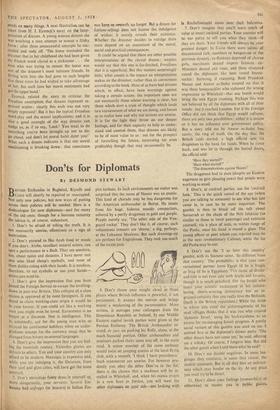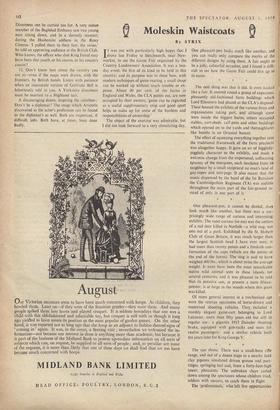Don'ts for Diplomats
By' DESMOND STEWART R1T1SH Embassies in Baghdad, Riyadh and .13Cairo will shortly be repaired or reoccupied. Not only new policies, but new ways of putting across their policies will be needed. Here is a dodecalogue for new diplomats—and for many of the old ones; though for a humane minority the advice is, of course, redundant.
1. DoN'T be afraid of telling the truth. It is not necessarily unwise, effeminate or a sign of inebriation.
2. DoN'T pretend to like Arab food or music if You don't. Arabs, excellent natural actors, can spot a performance in a flash. They are sensitive, too, about tastes and distastes. I have never met one who liked sheep's eyeballs, and most of them dislike eating with their hands. It is needless, therefore, to eat eyeballs or use your hands— unless you want to.
3. DoN'T give the impression that you have Joined the Foreign Service to escape the levelling- down in post-war Britain. This collapse of a class sYstem is approved of by most foreigners. If you dared to claim working-class origin it would be in Your favour. If you could act like a working man you might even be loved. Earnestness is no longer at a discount. Nor is intelligence. This is. admittedly, sad for the young man who so enjoyed his continental holidays when an under- graduate (except for the currency snag) that he changed from history to oriental languages.
4. DON'T give the impression that you are feel- ing the twentieth century. Vietori'an glories are defeats to others. You and your country can only afford to be modern. Nostalgia is expensive and, While you are indulging it, the Germans, from their steel and glass cities, will have got the latest contract.
5. DON'T encourage fancy dress in yourself or, more dangerously, your servants. Several Em- bassies had suffragis (or bearers) in Indian Em- pire turbans. In such environments no visitor was surprised that the name of Nasser was an emetic. This kind of charade may be less dangerous for the American ambassador in Beirut. He issues from his huge, hideous seaside compactum, ushered by a portly dragoman in gold and purple. People merely say, 'The other side of the Van- guard rocket.' They don't like it, of course; such voluminous trousers are 'shame,' a dig, perhaps, at the Lebanese Moslems. But such dressings-up are perilous for Englishmen. They reek too much of the recent past.
6. DON'T throw your weight about in those places where British influence is powerful, if not paramount. It annoys the natives and brings nearer a weakening of the paramountcy. More serious, it outrages your colleagues from the Dominican Republic or Ireland. In one Middle Eastern capital lavish parties were given at the Persian Embassy. The British Ambassador in- sisted, de lure, on parking his Rolls, alone, at the mock-Sassanid portico. Other ambassadors and ministers parked theirs some way off, in the main road. A minor member of the same embassy would insist on jumping queues at the local flying club, with a smooth, 'I think I have precedence.' Such manoeuvres are unwise. For however pru- dently you obey the other DON'TS in the list, there is the chance that a madman will be in- stalled in Whitehall, and, when his mania erupts in a new Suez or Jordan, you will want the other diplomats on your side—not looking with In Rochefoucauld noses over, their balconies.
7. DON'T imagine that you'll learn much of value at smart cocktail parties. Your enemies will be too polite to tell you what they think—if they are there. Your friends will always be your greatest danger. In Cairo there were salons of discontented rich, members or hangers-on of the previous dynasty, ex-flunkeys deprived of chorus girls, merchants denied import licences, ex- Ministers denied exit visas, and these clustered round the diplomats like bees round honey- suckle : flattering, if cramping. Both President Nasser and Anwar as-Sadat assured me that it was these honeysuckles who siphoned the wrong impression to Whitehall—that one bomb would bring the new Egypt crashing. Perhaps this was not believed by all the diplomats with all of their minds : but it reached London. For if the Foreign Office did not think that Egypt would collapse, there are only two possibilities: either it is insane or it has no influence over government policy. But a story told me by Anwar as-Sadat has, surely, the ring of truth. On the day that the British raids started, a high official sent his dragoman to the bank for funds. When he came back, and was let in through the barred doors, the official said : 'Have they started?'
`Have what started?'
The demonstrations against Nasser.'
The dragoman had to state (despite an Eastern eagerness to give pleasing news) that people were working as usual.
8. DON'T, at cocktail parties, use the 'cocktail look.' This is the quick swivel of the eye (when you are talking to someone) to see who has just come in, in case he be more important. The gambit is then to break off the talk about Samarrah or the shape of the Nile felutcas (so similar to those in tomb paintings) and extricate yourself, via a plate of nuts, to within range of the Pasha, once his hand is round a glass. The young officer or poet whom you rejected may be in the next revolutionary Cabinet, while the fat old Pasha may be out.
9. DON'T use the 'I so love this country' gambit, with its Siamese sister, 'So different from that country.' The probability is that your con- versational partner loves Egypt (if he is Iraqi). or Iraq (if he is Egyptian). This tactic of divide- and-rule is not even safe with Arabs and Israelis, though it is much practised. For the Israeli who , hears your ecstatic excitement at his culture- loving, shorts-wearing democracy has an in- grained certainty that you really love the Bedouin. (Such is the British reputation.) While the Arab to whom you extol the picturesqueness of his mud villages thinks that it was you who created 'dynamic Israel,' using his backwardness as an excuse for encouraging Israeli progress. A purely social variant of this gambit was used on me. I arrived first at the diplomat's dinner party. 'The other drears have not come yet,' he said, offering me a whisky. Of course, I forgave him. But did the other guests when 1 told them what he said?
10. DoN'T use double negatives. In some lan- guages they reinforce, in some they cancel, the central statement. But in all they hint an indirect- ness which may border on the sly. At any price you must try to be direct.
11. DON'T allow your feelings (monarchical or otherwise) to master you in public places. Directness can be carried too far. A very minor member of the Baghdad Embassy saw two young men sitting down, and in a slovenly manner, during the Hashemite anthem in the Roxy Cinema. 'I pulled them to their feet, the swine,' he told an approving audience at the British Club. Who knows, the officer who shot King Feisal may have been that youth, or his cousin, or his cousin's cousin?
12. DON'T know best about the country you are in—even if the maps were drawn, with the frontiers, by British hands. Listen with patience when an inaccurate version of Gertrude Bell is laboriously told to you. A Yorkshire directness must be married to a Highland tact.
A discouraging dozen, inspiring the colothon DON'T be a diplomat? The snags which Aristotle discovered in the actor's profession can be found in the diplomat's as well. Both are important, if difficult, jobs. Both have, at times, been done badly.































 Previous page
Previous page